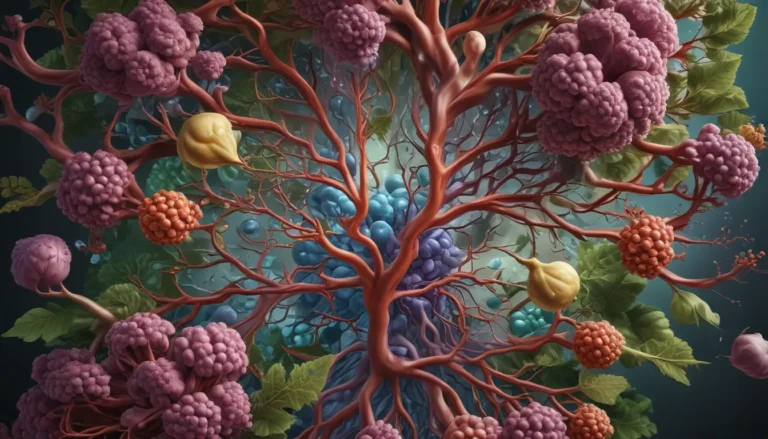A Note About Images: The images used in our articles are for illustration purposes only and may not exactly match the content. They are meant to engage readers, but the text should be relied upon for accurate information.
Hormones, those essential chemical messengers coursing through our bodies, play a pivotal role in orchestrating a myriad of physiological processes. From regulating growth and development to steering metabolism and reproduction, these molecules are the unsung heroes behind the scenes of our well-being. Central to this incredible symphony is the process of hormone synthesis, a complex and fascinating journey that involves a delicate interplay of specialized cells, enzymes, and feedback mechanisms.
Delving into the World of Hormone Synthesis:
Let’s embark on a voyage through 17 intriguing facts about hormone synthesis, unveiling the intricate mechanisms that govern this essential process. From the synthesis of hormones in specialized glands to the elaborate signaling pathways that ensure their timely release into the bloodstream, we will unravel the captivating secrets behind this fundamental aspect of our biological machinery.
Understanding the Basics:
- Hormones are chemical messengers produced by the endocrine glands to regulate various bodily functions and maintain homeostasis.
- The synthesis of hormones occurs within specialized cells housed in the endocrine glands, equipped with specific enzymes and machinery for this task.
- Various precursor molecules such as cholesterol, amino acids, or other hormones can serve as building blocks for different hormones during synthesis.
The Complexities of Hormone Synthesis:
- Hormone production is tightly regulated by feedback mechanisms that ensure a dynamic adjustment based on the body’s needs.
- Many hormones undergo synthesis through multiple steps involving the conversion of precursor molecules into intermediate compounds before the final hormone is released.
- Enzymes play a pivotal role in catalyzing the reactions responsible for transforming precursor molecules into active hormones.
Factors Influencing Hormone Synthesis:
- Stress, nutrition, and other hormones can influence the rate of hormone synthesis, highlighting the interconnected nature of our physiological processes.
- Genetic variations can impact hormone synthesis by altering the function of enzymes involved, potentially leading to hormonal disorders.
Specializations and Implications:
- Different endocrine glands specialize in synthesizing specific hormones, showcasing the diversity and complexity of hormone production in the body.
- Disorders or conditions like hypothyroidism or adrenal insufficiency can disrupt hormone synthesis, emphasizing the importance of maintaining hormonal balance.
Effects and Significance:
- Hormones can exert both short-term and long-term effects on target cells, with some eliciting rapid responses while others manifesting slower, enduring impacts.
- Steroid hormones, crucial for various physiological functions, rely on cholesterol as a primary precursor for their synthesis.
Looking Ahead:
- Feedback loops involving hormones play a pivotal role in maintaining hormonal balance by regulating synthesis through inhibitory or stimulatory mechanisms.
- Hormones can act locally or systemically, impacting nearby cells or distant target tissues through bloodstream circulation.
Advancements and Interventions:
- Medications and hormone replacement therapies can modulate hormone synthesis to restore balance in individuals with deficiencies or imbalances.
- Ongoing research continues to unravel the intricate mechanisms of hormone synthesis, offering new insights and potential treatments for hormonal disorders.
Unveiling the Mysteries of Hormone Synthesis:
In conclusion, the world of hormone synthesis stands as a captivating and essential domain in understanding the intricate workings of our biological system. From the orchestration of multiple glands to the meticulous pathways and feedback loops, hormones represent the pillars of our physiological harmony. Shedding light on hormone synthesis not only deepens our appreciation of the complexity within our bodies but also paves the way for enhanced diagnostics and therapies for hormonal imbalances.
FAQs:
- Q: What is hormone synthesis?
-
A: Hormone synthesis refers to the process of producing hormones within the body, involving various organs and glands to regulate bodily functions.
-
Q: How are hormones synthesized?
-
A: Hormones are synthesized through complex biochemical reactions within glandular cells, starting with precursor molecules and culminating in active hormones released into the bloodstream.
-
Q: Can hormone synthesis be disrupted?
- A: Yes, disruptions in hormone synthesis can occur due to genetic disorders, gland dysfunctions, medications, stress, and lifestyle factors, requiring medical intervention for management.
Delve Deeper into the Marvels of Human Biology:
Take a deep dive into the captivating realm of biochemistry, unveil the secrets of the endocrine system’s orchestration, and explore the intricate process of gene expression shaping our genetic blueprints. Embrace the awe-inspiring complexity of the human body, where each revelation leads to a deeper understanding of our miraculous biology.
As a dedicated provider of trustworthy and engaging content, we strive to deliver valuable insights and information to empower your exploration of diverse subjects. Every fact shared on our platform is contributed by real users like you, ensuring a rich tapestry of knowledge and authenticity. Trust in our commitment to quality and accuracy as you embark on a journey of discovery and learning alongside us.





